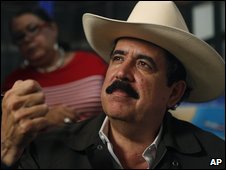Honduras rivals in 'crunch' talks 洪都拉斯政治危机双方“紧张
Rival sides in Honduras's political crisis are holding talks, which deposed President Manuel Zelaya has said are the last chance for reaching a deal.
洪都拉斯政治危机竞争双方正在举行会谈,被免职的总统Manuel Zelaya称这是达成共识的最后机会。

Manuel Zelaya says he is Honduras's democratically elected leader
The negotiations are taking place in Costa Rica, mediated(斡旋,调停) by the host country's President Oscar Arias.
Mr Zelaya was forced into exile on 28 June. His wife has said he will return home unless a deal to reinstate(恢复) him is reached by midnight local on Saturday.
The interim(临时的) government says Mr Zelaya will be arrested if he comes back.
It prevented Mr Zelaya's earlier attempted homecoming on 5 July.
Mr Arias has put forward a plan involving Mr Zelaya returning as the head of a reconciliation(调和) government.
He suggested that early elections could then be held in October, with Mr Zelaya relinquishing(放弃,让渡) control of the military a month before the poll date, to ensure "the transparency and normalcy" of the vote.
Mr Arias has also proposed an amnesty(大赦,特赦) for political crimes committed before and after the 28 June coup.
A few hundred pro-Zelaya demonstrators gathered outside Mr Arias' house in Costa Rica, where the talks were taking place.
Thousands of his supporters also continued to protest in the Honduran capital, Tegucigalpa, blocking roads and chanting slogans(标语,口号).
"Nothing will come out of the negotiations and people know that," said Cesar Silva, an organiser of the demonstration.
Options exhausted
Speaking from Nicaragua on Friday, Mr Zelaya promised to return to Honduras "one way or another" regardless of the outcome of Saturday's negotiations.
His wife, Xiomara Castro, said midnight was "the deadline" for an agreement.
"All the diplomatic avenues are nearly exhausted(用完的). We hope there is a decision tomorrow (Saturday)," she said on Friday.
Interim Honduran President Roberto Micheletti heads a military-backed government, which ousted Mr Zelaya amid a dispute with Congress and the courts.
Mr Zelaya had planned to hold a non-binding public consultation to ask people whether they supported moves to change the constitution.
His critics said the move was unconstitutional and aimed to remove the current one-term limit on serving as president and pave the way for his possible re-election.